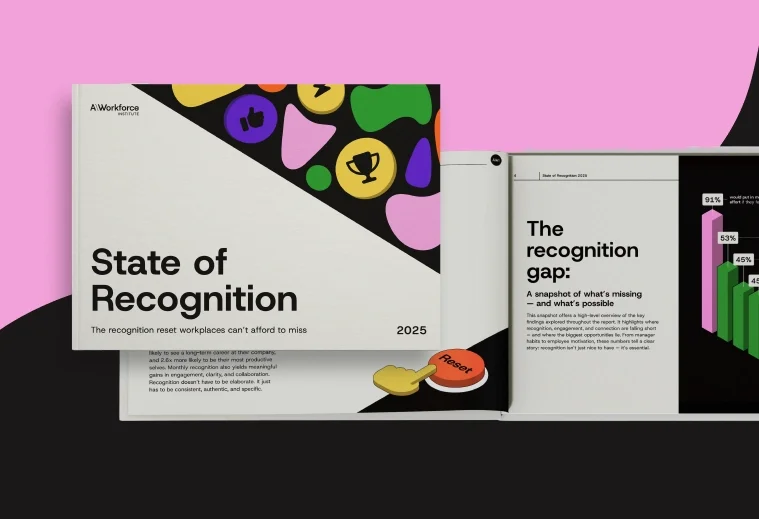Table of contents
Create a culture that means business™
Schedule a demo with an Achievers solution expert today.
Employee recognition statistics give HR leaders a window into what truly drives performance, engagement, and retention in today’s workplace. With top talent tougher to attract and even tougher to keep, understanding how recognition drives engagement, and performance has never mattered more.
But HR can’t rely on gut instinct alone. Data is what turns good intentions into meaningful, lasting programs.
By grounding recognition strategies in data, organizations can better understand what motivates their people, coach managers more effectively, and create a company culture where employees feel genuinely valued.
Let’s take a closer look.
Recognition and engagement
1. 91% of employees say that receiving recognition for their work motivates them to put in more effort
Recognition motivates — according to the 2025 State of Recognition Report, 90% of employees say they’re more likely to put in extra effort when their work gets noticed. It’s a simple concept with big impact: when people feel appreciated, they stay engaged and keep doing the things that matter. And it sticks, too. 92% say they’re likely to repeat a behavior they were recognized for.
2. 82% of employees who are meaningfully recognized at least once a month say they feel enthusiastic about their job
That kind of energy isn’t accidental — it’s the result of feeling seen, valued, and connected to the work that matters. Insights from Achievers Workforce Institute (AWI) tell us that when recognition happens regularly and genuinely, people show up with more enthusiasm — not out of obligation, but because they want to.
3. 45% of employees recognized monthly or more are very engaged at work
Engagement thrives on consistency, not grand gestures. When recognition becomes a habit, people feel more connected to their work. Insights from AWI prove that regular appreciation helps employees stay focused, motivated, and genuinely invested — the kind of engagement you can’t manufacture overnight.
Retention and loyalty
4. Employees who don’t feel sufficiently recognized are 2x as likely to say they’ll leave their job within the year
Gallup’s research shows what many teams learn the hard way — when recognition is missing, retention suffers. Feeling valued keeps people connected to their work and their workplace. And in environments where quiet cracking slowly chips away at trust, consistent recognition helps re-establish psychological safety and gives people a reason to stay.
5. Companies with effective recognition programs report a 31% lower voluntary turnover rate
According to SHRM’s interview with Disruptive HR, companies with strong recognition programs see 31% lower voluntary turnover. That’s a big deal for productivity — fewer exits mean more momentum, better collaboration, and less time spent hiring and training. The takeaway? When employees feel valued, they’re more likely to stay, grow, and contribute at their best.
6. 26% of employees say feeling recognized for their efforts would help mitigate the impact of an understaffed team
Feeling overwhelmed is one thing — feeling overlooked is another. Insights from AWI show that recognition helps soften the blow of short staffing. It won’t add hours to the day, but it can remind people that their extra effort still matters.
7. 60% of employees say that feeling recognized for their efforts would decrease their desire to either job hunt or accept a call from a recruiter
Recognition keeps people anchored. According to AWI, most employees would be less tempted to jump ship if they felt appreciated where they are. It’s a simple truth: people stop looking elsewhere when they feel seen right here.
Business outcomes and strategies
8. Organizations that prioritize employee recognition see a 21% increase in productivity
When recognition becomes part of the culture, productivity rises — by 21%, according to AWI. That’s the result of employees knowing their work matters. Recognition strengthens performance by reinforcing the behaviors that drive focus, commitment, and results.
9. Employees who receive weekly recognition are 2.6x more likely to be their most productive selves
AWI researchers from the State of Recognition Report found that employees who get recognized at least once a month through an online platform are twice as likely to feel productive — and not quietly browsing job postings. The difference? Recognition actually happens. When it’s built into the flow of work, it’s easier to give, harder to forget, and a lot more impactful.
10. 50% of HR leaders surveyed identified employee retention as one of their top three goals for their employee strategy
Half of HR leaders say retention is a top-three focus, which means the other half is likely thinking about it too, just with less sleep. According to a study by Achievers and HRD Connect, recognition is one of the most effective (and sustainable) ways to keep people around. It turns out that a well-timed thank-you can do what exit interviews can’t — keep great people from leaving in the first place.
11. Employee sentiment around culture, connection, and recognition declined in Q3 2024, with the Culture Indicator dropping from 104.2 to 101.9
When people feel disconnected from their culture, everything else starts to feel harder. This dip in Eagle Hill’s Culture Indicator is a reminder that culture isn’t static — it needs to be nurtured. Recognition helps employees feel valued and connected, especially during times of change.
12. 65% of HR leaders say they use data from recognition platforms to inform learning and development strategies
Recognition data is more than a pat on the back — it’s also a blueprint for development. According to the 2024 Achievers Engagement and Retention Report (EOR), HR leaders are using these insights to spot potential, support growth, and build the kind of careers people want to stay for.
Culture and belonging
13. Employees recognized at least monthly report 2.5x belonging
Belonging starts with being noticed. The same Achievers engagement report found that consistent recognition helps employees feel like they truly fit — not just as a cog in the machine, but as someone who matters to the team.
14. 79% of employees who are meaningfully recognized at least monthly feel a strong sense of belonging at work
Recognition builds culture — not through slogans, but through action. According to AWI insights, regular, meaningful recognition makes nearly 80% of employees feel like they belong. That kind of belonging is what helps people feel grounded, connected, and ready to do their best work.
15. 89% of employees who are meaningfully recognized at least monthly feel warmly welcomed at their company
Feeling appreciated early on helps people settle in, build confidence, and start strong. According to AWI, regular, meaningful recognition plays a crucial role in how welcomed employees feel during key moments. When recognition is built into the employee experience, people are more likely to stay connected and engaged from the start.
16. Employees who receive at least monthly meaningful recognition from their managers report 3x more manager trust
Recognition builds trust the same way trust is lost — moment by moment. Achievers’ EOR Report shows that when managers recognize employees consistently, trust follows. It’s a small habit with a significant impact on relationships and results.
Global recognition
17. 60% of Americans feel meaningfully recognized at work, compared with the global average of 52%
Recognition in the U.S. is ahead of the curve, but the bar’s still low. More employees report feeling meaningfully recognized and have access to online tools — yet only 27% say that recognition feels consistent and genuine. This insight from AWI suggests frequency alone isn’t enough — it’s the meaning that matters.
18. 52% of Australia-based employees are recognized monthly at work, but only 15% of Australians feel meaningfully recognized
Recognition is happening in Australia — it just isn’t hitting the mark. Over half of employees receive monthly recognition, but only 15% say it feels meaningful. Insights from AWI show that when recognition lacks sincerity or context, it falls flat — proving thoughtful moments matter more than frequency.
19. 60% of Australia-based employees say that their recognition program helps build culture
Recognition is a key culture-builder, especially in Australia. 60% of employees say their recognition program supports culture, according to AWI. But with many programs still missing peer-to-peer or points-based features, there’s room to grow. The right tools can help recognition feel more inclusive and impactful.
20. 32% of Singapore employees cite not feeling valued, appreciated, or recognised as the main reason they consider leaving their current employer
Recognition plays a critical role in keeping people around. In Singapore, 32% of employees say they’re considering leaving their jobs because they don’t feel valued, according to a recent Ipsos report. When appreciation is missing, motivation fades — and talent starts looking elsewhere.
Turning employee recognition statistics into action
Recognition might seem simple — say thank you, give a shoutout, move on. But the numbers say otherwise. When done right, recognition shapes how people feel about their work, their team, and whether they’re in it for the long haul.
It’s more than feeling good at work (though that’s certainly a perk). It’s about building a culture where people stay motivated, show up with purpose, and know their work matters. The most effective recognition strategies aren’t occasional — they’re consistent, personalized, and part of the everyday experience.
That’s where Achievers comes in. With the highest frequency of recognition in the industry, seamless integrations, and insights baked into every interaction, our recognition platform helps HR leaders turn values into actions — and actions into results.
Because when recognition works, people do too.




